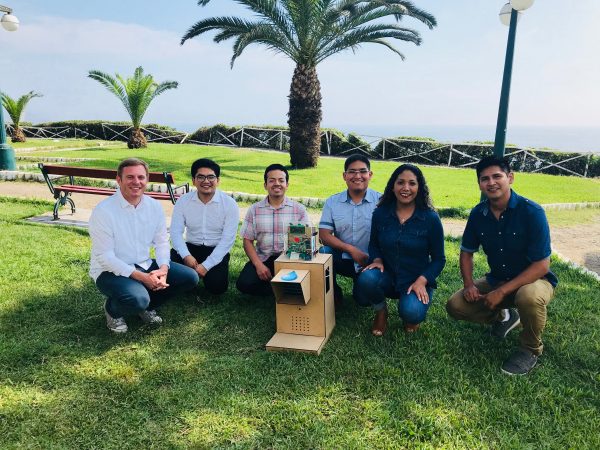
Inventum, a peruvian startup, came up as a proposal that links the talent of mechanical and mechatronic PUCP engineers from the undergraduate and postgraduate programs with the experience of the graduates of the International Managerial MBA of Centrum Catolica, in order to create a new technology with social and environmental impact that, at the same time, promotes the economic development of the country. Furthermore, their project Pukio (“spring”, “fountain” in Quechua) offers an innovative proposal to face global challenges such as water scarcity, poverty and hunger in the most vulnerable regions of the world. The project received the People’s Choice Award on the Cisco Problem Solver Challenge, and it was considered among the 10 most innovative proposals of the world. We talked to the team to know more about their objectives and plans for the future.
What is Pukio about?
Pukio: water and smart farming, is the first project of the company that consists of a smart mechatronic system that makes use of renewable energy to generate clean liquid water through the condensation of the water vapor found in the air. In addition, through the sensors installed on the croplands, it obtains valuable information regarding climatic conditions to improve the yield of crops with a direct interaction with the farmers using the Internet of Things. It can work with any source of renewable energy. The Pukio system will be placed on the croplands and it will complement irrigation activities. Furthermore, it will be useful to know, in real time, the state of the crops and their yield. In this way, farmers will be able to anticipate the changes and make decisions to improve productivity, especially when it comes to crops that are delicate and of high value, such as the ones that abound in Peru.
How did you come up with the idea to develop this project?
The members of this team come from different regions of the country (one of them is from The Netherlands, but he has been to almost every region of Peru) and we have seen and experimented many of the problems that could be solved with technology; from the production of native potatoes in the highlands, going through the fallow lands of the coastal desert, to the difficulties of the Amazonian communities to get access to clean water. What unites us is the wish to use our knowledge and experience to the service of society, because we know that a country improves thanks to an innovation oriented to its particular needs.
What are its technical specifications? How does it work?
It uses a mechatronic system to find the dew point under any climatic or geographic condition, which allows the condensation of vapor in great amounts, therefore taking full advantage of the energy supplied. We planned for a functioning even in conditions of 20% of relative humidity and 30°C (86°F) of ambient temperature. We include, also, the use of 100% renewable energy, taking into account the global trend of the lowering costs of the kWh coming from this kind of sources (0.10 USD and still descending, according to Forbes). We should also mention that, according to estimations of the UNESCO, in 2025, approximately 1800 million people will live in a context of absolute scarcity of water, so there is an urgent need to take care of and it is important to find alternatives to conventional methods. On the other hand, smart food production is becoming a necessity, taking into account the perspectives of the increase of global population, since, according to the FAO, 80% of crops depend exclusively of rain, which makes them vulnerable to climate change.
Thinking about the future, what is the next step in the project?
The objectives are, first, to achieve a commercial production of 1000 liters of water per day, which may be used on large-scale applications that will go from the remediation of natural disasters, through animal husbandry in remote areas, to the supplying of water to vessels in high seas. The second objective is to increase said technology up to 20000 liters per day to complement food production with the smart farming system.
We are forming alliances with companies that are important in the sectors of energy and information technologies, to proceed with the development collectively. Likewise, we plan to strengthen the links with our university to keep improving this technology by creating synergies that also allow academic production, in order to create a virtuous link of innovation in its three components: market, implementation and technology.
How has the experience in the international Cisco contest been so far?
It has been an extremely fulfilling experience, because, since it was a contest with many stages, we had to do to an exhaustive research in order to answer the questions of the jury, which were very precise. This has allowed us to improve the business and commercialization models adapting the technologic requirements to the particular needs of the end-users.
What qualities or knowledge acquired in your undergraduate formation at PUCP do you think has been useful to you?
The humanistic formation mixed with the exigence of the programs, especially the approach of us as creators of technology in the design courses. All of this complemented with the ability of self-learning new topics.
Team:
Farit Zúñiga – Pharmaceutical Chemist and CENTRUM Catolica MBA.
César Coasaca – Mechanical Engineering and CENTRUM Catolica MBA.
Piet-Hein Briët – Agribusiness & trade and CENTRUM Catolica MBA.
José Luis Bohórquez – Mechatronic Engineer and PUCP Master’s degree in Mechatronic Engineering
Gianmarco Soria – PUCP Mechanical Engineer
Takao Shimabukuro – PUCP student of Mechatronic Engineering